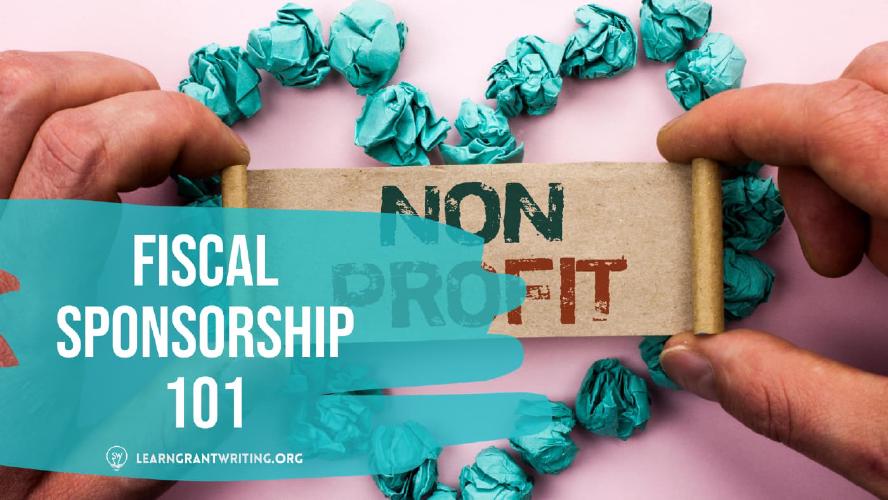Often when we have a big idea, our first thought is, "I should start a nonprofit!" But before you jump into a huge pile of paperwork, let’s look at what you need:
- Tax exempt status
- Administrative infrastructure, and
- Funding
Did you know you could use a fiscal sponsor for these needs?
We love the way Propel Nonprofits talks about this topic and you can check out their YouTube video linked below . Coincidence it features a unicorn?! (The unicorn is our mascot 🦄)
This video does a great job of explaining why it can be beneficial to test the waters with your idea before jumping all in with becoming your own nonprofit.
But first…
What is fiscal sponsorship?
A fiscal sponsor serves as the administrative “home” for your cause. A more detailed fiscal sponsorship definition is this:
Fiscal sponsors are existing nonprofit organizations that provide fiduciary oversight, financial management, and other administrative services to help build the capacity of charitable projects.
Why would we want you to use a fiscal sponsor?
There are a lot of good reasons!
Even if you were to become a new nonprofit, you don’t have much street credibility managing grants yet. It can be strategic to partner with an organization that already has a strong history of managing grants. You can work together for a few years before branching off on your own.
You may discover that you never need to form your own nonprofit. You may find that your mission can be achieved within the structure of the fiscal sponsor. This keeps you from all the paperwork and headache of creating an entirely new entity.
The most common reason for wanting a fiscal sponsor is because you don’t have the resources to manage administration. You want to be doing the work - the part that inspired you to start in the first place!
Consider a fiscal sponsor if you have an all-volunteer organization. This way you don’t burn out your volunteers dealing with tedious administrative responsibilities.
It is also reassuring to a funder when there are paid staff to manage grant reporting, expense tracking, etc.
Another reason to consider having a fiscal sponsor is when your idea is a project with a clear beginning, middle, and end. You never intend to be a permanent organization.
For example, we worked with a group of artists who were developing an international pan-arctic art project. They partnered with a 501(c)3 nonprofit organization to receive philanthropic donations and grant funding. This arrangement let the artists focus on their passion, while the nonprofit handled grant management.
Let’s recap that… how can fiscal sponsorship help you?
As an unincorporated community group, you can:
- Receive tax-deductible contributions from grant agencies and donors.
- Do the work you are passionate about; not be stuck waiting for nonprofit status.
- Benefit from name recognition of your nonprofit sponsor.
- Receive technical assistance and administrative support. Support can include payroll and accounting services, office space, publicity, and capacity building.
Discover Grant Writing as a Career
If you’re interested in becoming a grant writing consultant, check out this free training on how you can pull off a meaningful career change.
Access Free Class
What else should we know?
For this arrangement to work, your project has to have a charitable purpose. It needs to naturally align with the fiscal sponsor, and it should have a clear life span.
What are common fiscal sponsorship fees?
It is common and acceptable for the fiscal sponsor to charge an administrative fee, which is usually a percentage of all funds held on behalf of the sponsored group. Typically this is 5-10%. If a fiscal sponsor managed $50,000 for your charitable project and they take 10%, the fiscal sponsor would keep $5k.
How do we find a fiscal sponsor?
👉 Believe it or not, there is actually a fiscal sponsorship directory! Here is the National Network of Financial Sponsors website. They are a membership organization that promotes the understanding and professional practice of fiscal sponsorship.
👉 If you are doing community-based work, we encourage you to check out Ioby.com. They provide fiscal sponsorship, access to their crowdfunding platform, and a personal coach to help you build support from your community.
👉 Your other option (and the one we recommend starting with) is looking local for a fiscal sponsor. Start by brainstorming a list of nonprofits that have organizational alignment with yours. Ask others in your network what ideas they have. Once you have a healthy list of 10 options or so, start reaching out.
Email or request a phone meeting to ask if the nonprofit organization provides fiscal sponsorship. You should have a 1-2 page overview of your project prepared to send them.
Ideally you find an organization that has experience being a fiscal sponsor. They will be more efficient because they have processes in place.
If possible, meet in-person with those that express interest in your idea. Is there good synergy? Be sure to know what benefit they get out of housing you under their wing. Is it a great public relations building project? How do you align with their mission?
If you are a good match for each other, you can then get into negotiating the specifics of how you will work together. At its root, you want to be extremely clear about the expectations of both parties.
In our online grant writing training, we provide sample fiscal sponsorship agreement templates. Get started with our Free Grant Writing Class.
Free Grant Writing Class
Learn the 7-steps to write a winning grant application and amplify the impact you have on your community.
Access Free Class
Fiscal sponsorship in a nutshell!
Hopefully the concept of having a fiscal sponsor inspires you to get started. It’s a great way for you to work on what you most care about without getting mired in paperwork.
Have you used a fiscal sponsor in the past? Shoot us a DM on Instagram to share your experience! (@learngrantwriting)






